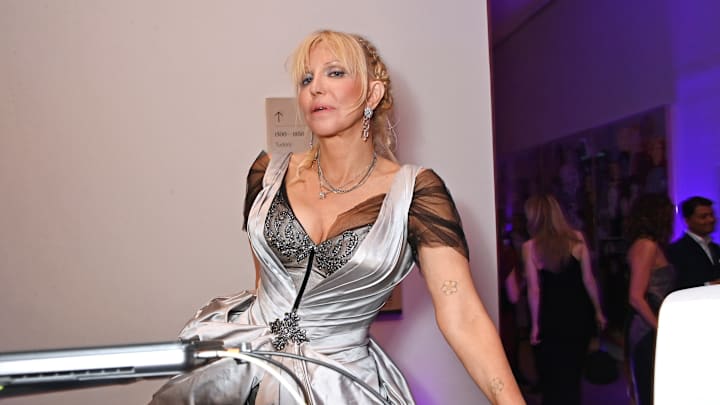In case you missed it, rocker Courtney Love recently unveiled her latest venture into the airwaves with a fresh radio series on BBC Radio, diving deep into the realm of women in music. Titled Courtney Love's Women, the eight-part series explores the impact and legacy of various female artists throughout history.
In an interview with The Standard, Love, known for fronting the iconic band Hole, shared her insights on the project and her perspectives on contemporary music. While expressing her admiration for trailblazers like Patti Smith, Nina Simone, and Joni Mitchell, Love didn't shy away from voicing her critiques of some of today's biggest names. It makes one wonder if Courtney Love is...well, all that lovable.
Taylor Swift, often lauded as a pop phenomenon, didn't earn high praise from Love. "Taylor is not important," Love remarked bluntly. Love suggested that Swift might cater to a certain demographic, but artistically, she doesn't intrigue. Even Lana Del Rey, once a favorite of Love's, fell out of favor. Love suggests she used to appreciate Lana's music until she covered a John Denver song. Courtney Love suggests that, nowadays, such a pop sound feels too pervasive, even infiltrating her own creative process.
Courtney Love vs. Madonna
Love didn't reserve her criticism solely for contemporary stars; she also took aim at Madonna, albeit with a touch of nostalgia. Madonna and she have never seen eye to eye, Love confessed. Although she admits the Madonna-starring film Desperately Seeking Susan' holds a special place in her heart, it's more for the era it embodies than for Madonna herself.
Are all successful artists great artists?
Despite acknowledging the strides made by women in the music industry, Love lamented the homogenization of their artistry. She suggests there's an abundance of successful female artists today, which is commendable. However, according to her, it's disheartening to see so many succumb to a formulaic approach, and she suggests it's like hearing the same song on repeat.
Love's musings extended to Beyoncé's foray into country music, a move she found conceptually intriguing yet artistically lacking. In a perhaps condescending tone, she says she respects Beyoncé's boundary-breaking spirit, but personally, her music doesn't resonate with her.
Food for thought
In Love's eyes, the allure of music lies in its diversity and individuality, qualities she believes are increasingly diluted in today's industry. While we might disagree with Courtney Love and accuse her of trying to generate controversy to gain relevance in the modern era, there is some food for thought here.
Personally, I disagree with Love's statement that Taylor Swift is not important. Quite simply, if enough people find someone important, they pretty much are. Fans jumping for joy at Taylor Swift concerts will actually register on the Richter scale. That is more of an objective fact, rather than assessing the quality of their creative output. Similarly, even though I am not a huge fan of the band Kiss, I must acknowledge they are themselves a popularly, successful, and influential rock band. For me to say otherwise almost feels like a lie.
At the same time, if I judge Kiss too much for being a highly commercially contrived band, I sound naïve or hypocritical, as I surely like other commercially successful bands as a fan of rock music. That being said, it does feel to me like most modern pop lacks the sort of life captured in something like Michael Jackson's Thriller (and I'm not even the biggest MJ fan). If music feels like a Mickey Mouse excretion, it can be a bit of a problem for anyone who likes even a bit of edge.
Where to draw the line?
So, that could lead to another interesting question: Where do we really need to draw the line in fandom debates? Perhaps when we start accusing musicians of being witches, as hate preacher and conspiracy theorist Tiphani Montgomery did, regarding Beyoncé.
Montgomery specifically said: "When a witch has a coven, it's normally a small thing. Witch's covens are normally 3-7 people. When it becomes thousands, it's called a hive. Y'all a part of that lady beehive? And you call yourself a Christian?...You think you not going to that lady's concert is not an initiation?... That entire concert is a gate!"
Yeah, you might want to draw the line right before that point in your criticism of modern pop artists.
